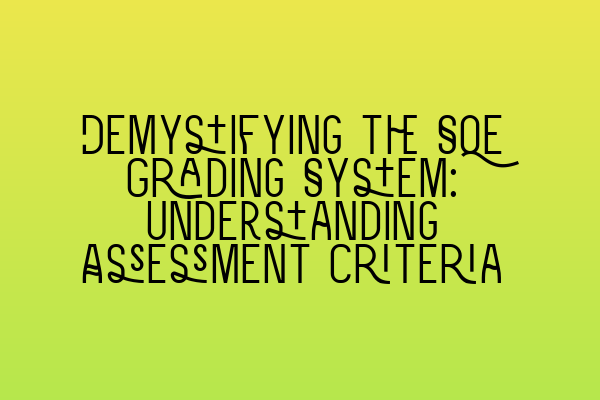Are you gearing up to take the Solicitors Qualifying Exam (SQE) and feeling overwhelmed by the grading system? Don’t worry, you’re not alone. Many aspiring solicitors find the assessment criteria confusing and mystifying. But fear not, in this blog post, we will demystify the SQE grading system and help you understand the assessment criteria better.
The SQE grading system is designed to evaluate your knowledge and skills across various legal practice areas. The exam is divided into two stages, SQE1 and SQE2, each with its own set of assessment criteria. Let’s dive in and explore the assessment criteria for each stage:
SQE1 Assessment Criteria
SQE1 focuses on assessing your practical legal knowledge and understanding in various practice areas. The assessment criteria for SQE1 include the following:
1. Foundational Legal Knowledge: This criterion evaluates your understanding of the core legal principles and concepts required for legal practice. Ensure you have a solid grasp of areas such as contract law, tort law, legal systems, and constitutional law.
2. Business Law and Practice: This criterion examines your knowledge of business law, commercial transactions, and legal issues pertaining to businesses. It covers areas such as company law, partnership law, and commercial contracts.
3. Dispute Resolution: This criterion assesses your knowledge of civil litigation, alternative dispute resolution methods, and the court system. Familiarize yourself with the civil procedure rules and understand how to handle disputes appropriately.
4. Property Law and Practice: This criterion evaluates your understanding of property law, including land law, the conveyancing process, and leasehold and freehold property transactions. Check out our related article on Property Transactions and the Legal Process: A Comprehensive Guide to dive deeper into this subject.
SQE2 Assessment Criteria
SQE2 focuses on assessing your practical legal skills through simulated real-life scenarios. The assessment criteria for SQE2 include the following:
1. Client Interviewing and Attendance: This criterion evaluates your ability to effectively interview clients, understand their needs, and provide suitable legal advice. It also assesses your professionalism and communication skills.
2. Legal Research and Written Advice: This criterion examines your research skills, ability to analyze legal issues, and provide well-reasoned written advice to clients. It also assesses your written communication and legal drafting skills.
3. Case and Matter Analysis: This criterion assesses your ability to analyze complex legal scenarios and apply relevant legal principles. It requires critical thinking, problem-solving, and effective application of legal knowledge.
4. Advocacy and Oral Presentation: This criterion evaluates your ability to present arguments persuasively, advocate for clients, and effectively represent them in various legal settings. It focuses on your oral communication and persuasive skills.
Now that you have a better understanding of the assessment criteria for both SQE1 and SQE2, it’s time to start preparing strategically. Develop a study plan that covers all the relevant practice areas and allocate sufficient time to each criterion. Remember, practice and consistency are key to success in the SQE.
To further enhance your understanding of specific topics, check out our related articles:
– Joint Ownership: Legal Considerations for Co-Owners of Property
– Commercial Leases: Essential Insights for Business Premises
– Tenant Rights in the UK: Understanding Your Legal Protections
– Property Transactions and the Legal Process: A Comprehensive Guide
– Examining the Intricacies of Land Law in the UK
By utilizing these resources, you’ll gain a more comprehensive understanding of the topics and boost your performance in the SQE.
Remember, the SQE grading system may seem complex at first, but with proper preparation and understanding of the assessment criteria, you can confidently navigate the exam and achieve success. Good luck with your studies!

Leave a Reply